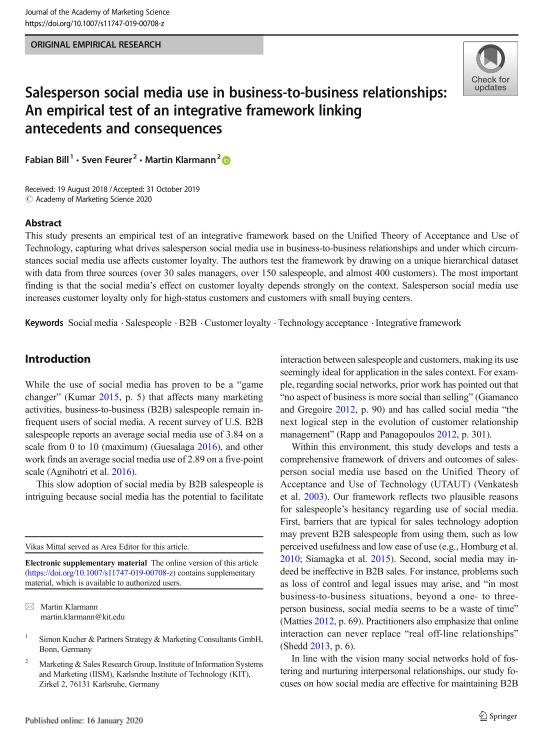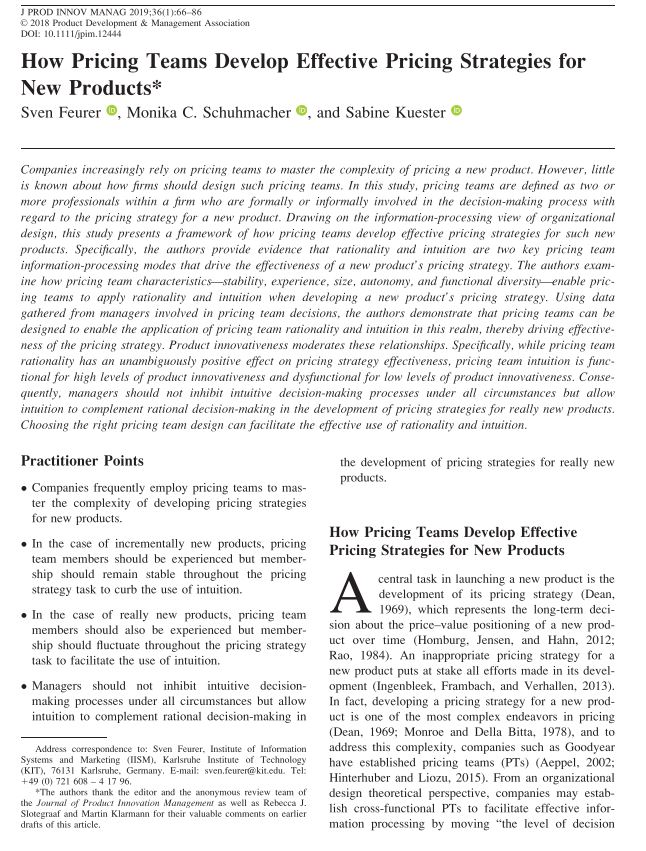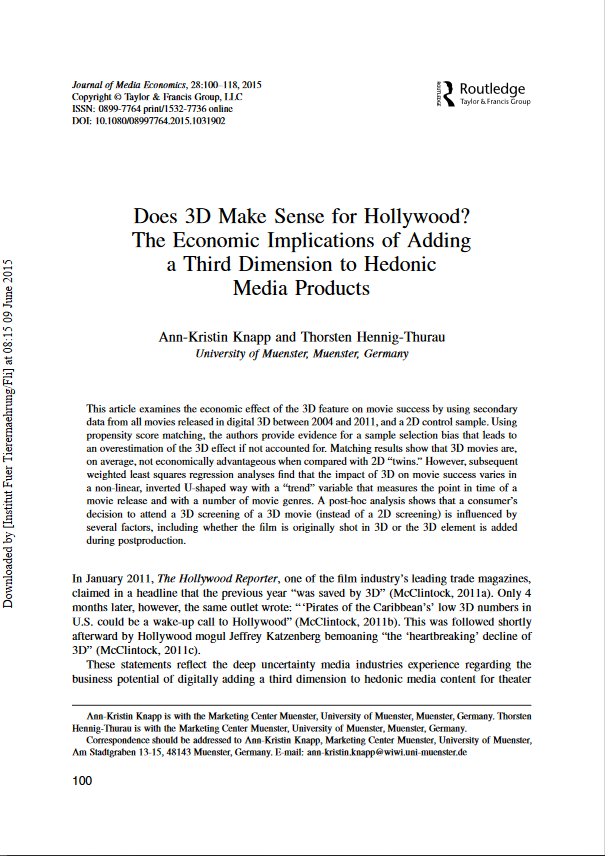Ausgewählte Publikationen
|
|
|
|
|
|
Salesperson social media use in business-to-business relationships: An empirical test of an integrative framework linking antecedents and consequences Fabian Bill, Sven Feurer & Martin Klarmann Journal of the Academy of Marketing Science (2020) |
How pricing teams develop effective pricing strategies for new products Sven Feurer, Monika C. Schuhmacher & Sabine Kuester Journal of Product Innovation Management (2019) |
Pre-Release Consumer Buzz Houston, Mark, Ann-Kristin Kupfer, Thorsten Hennig-Thurau, and Martin Spann Journal of the Academy of Marketing Science (2018)
|
Does 3D Make Sense for Hollywood? The Economic Implications of Adding a Third Dimension to Hedonic Media Products Knapp, Ann-Kristin and Thorsten Hennig-Thurau Journal of Media Economics (2015) |
Forschungsprojekte
Current Projects
Personas (in new product development & marketing) serve as data visualization and communication tool to enhance customer understanding. Due to a lack of knowledge and resources, it often becomes a “fill-in-the-blank academic exercise” (Carson 2022) in practice. Indeed, if visual representations are driven by subjective mental models such as stereotypes, they can bias decisions and lead to negative outcomes such as new product ideas that are neither innovative nor customer oriented. An example for evolving design practices through artificial intelligence is the application of machine learning to make inferences about consumers based on online activities. This relates to the human capability of using partial knowledge to draw conclusions – the interpretative step that affects both Persona creation and perception. We investigate those two steps in the context of new product ideation and create an automatic Persons generation tool based on text mining techniques and natural language generation. For further information, please contact: Beatrice Weber
Manipulation along the Online Customer Journey and the Role of Artificial Intelligence. The increased use of artificial intelligence (AI) in online marketing have enabled firms to practice marketing in an increasingly automated and individualized way. Consumers´ decision making processes along their online journeys are influenced by the use of new technologies in order to "nudge" consumers through so-called moments-of-truth, influencing future consumer behavior. Modified choice architectures, technology-mediated simulations of social interactions, data-driven targeting, or algorithmic communication in the form of programmatic advertising or recommender systems stimulate debates about the manipulative character of new marketing technologies. We investigate AI-mediated marketing practices along the online customer journey against the background of the fuzzy notion of manipulation. For further information, please contact: Robin Pade
Self-Tracking In An Offline Shopping Context. The latest technological developments in the field of wearables are escalating rapidly and influencing our current lives more than ever (e.g. step recording via a smart watch). The core task of wearables is self-tracking and the subsequent use of the generated data. The goal of this research is the utilization of such self-tracking devices in the form of wearables to find ways of supporting one's own goal fulfilment in the context of offline purchasing behaviour. For further information, please contact: Saskia Jacob
The Effectiveness of Brands in Voice Shopping. Presently every fifth US household owns a smart speaker that comes with voice shopping functionality. Voice shopping is a new phenomenon characterized by sequential product presentation. Sequential product presentation can alter consumer’s decisions since it changes the way information is distributed among consumers (e.g. a consumer has up to no knowledge what the next option will be). This could affect brand effectiveness since a situation could arise at which many consumers simply choose one of the first presented products without assessing further products and independent from their brand. This research projects examines whether or not such a scenario is likable and how the effectiveness of brands changes in voice shopping. For further information, please contact: Martin Klarmann
Completed Projects:
Concept Testing for and Marketing of Radical Innovations. One of the most vexing challenges facing consumers is the potential adoption of a radical innovation or really new product (RNP). Much of the challenge is due to consumers’ difficulty to learn about an RNP and to evaluate its novel benefits in the light of the behavioral change required in order to utilize these benefits. Thus, the goal of this project is to better understand the process by which consumers make an adoption decision for RNPs. Moreover, in order to predict the acceptance and success of new product or service concepts better, companies often rely on a survey of the purchase intention in order to generate a rough estimate of the actual behavior. However, the abstractness of a radically innovative concept and the time distance to the actual behavior can lead to biased predictions. In order to discard less promising concepts at an early stage, new survey methods must be found with regard to concept tests that can predict actual purchasing behavior better, which is the goal of this research project.
Artificial Intelligence driven Clickbait Detector. Clickbait refers to a certain type of online content - mostly misleading and exaggerated - that aims at enticing the reader to click on deposited links. Such content is usually found on social media platforms, search engine pages or websites with advertising content. Together with the Marketing & Sales Research Group a team of four students developed a clickbait detection tool that uses a pre-trained neural network to assign advertising claims the probability of being clickbait. The tool is publicly available and can be tested here.
Expectation Management in Equity-based Crowdfunding of Startups. Unicorn startups, that is privately held firms worth one billion dollar or more, are overvalued by an average of 50 % compared to their fair market value. This finding is exemplary for the startup scene, where exaggerations, embellishments and “fake it till you make it” have become an integral part of the mentality. Using experiments and secondary data studies, we investigate whether hyperbolic language in startup value propositions helps or hurts equity-based crowdfunding. In addition, we seek explanatory approaches that account for our findings. Further information can be found here.
Product Automation. Recent technological developments (AI, machine learning) have enabled firms to develop and launch products that take over complex tasks that consumers used to have to carry out themselves (e.g., autonomous driving, lawn mower robots). While automated products create benefits by freeing up consumers’ resources, they still face a great deal of resistance from consumers. The goal of this project is to better understand reasons for consumer resistance to automation, such as consumer nostalgia. For further information, please contact: Sven Feurer
Pricing of new products. Developing an appropriate pricing strategy for new products is challenging, but imperative for successful market launch. Practitioners often wrongly assume that appropriating value is not an issue once value has been created in the first place. This research project relates to the following key questions: (1) How do consumers perceive launch prices of new products, that is, how can firms price new products for consumer acceptance, and (2) how should firms organize the internal process of developing a pricing strategy for new products? Central methodological approaches are lab experiments along with analyses of variance and multiple regression analyses, and structural equation modeling. For further information, please contact: Sven Feurer
Culture of innovation. Organizational culture is increasingly identified both by scholars and companies as a main driver of innovation. This research focuses on the conceptualization of culture of innovation and related concepts, issues of causality of its drivers and outcomes and its relation to national culture. These questions are investigated in a series of empirical studies. Further information can be found here
Salespeople’s role in new product development. Salespeople’s reluctance to sell innovations is a crucial cause why new product introductions fail or new SFA systems are not used efficiently. In this dissertation project we want to investigate the role of the sales force in the innovation process and the new product development. Furthermore, we examine the importance of salesperson innovation adoption. Central methodological approaches are meta-analytic structural equation modeling, factor analysis, and multilevel regression. Further information can be found here
Exploring the departmental cultures of marketing, sales, and R&D. To enable innovation, marketing, sales, and R&D departments need to coordinate their activities. When this cross-functional integration of activities fails, practitioners and academics often point to cultural differences between departments as culprit. In this research project we empirically describe the departmental cultures of marketing, sales, and R&D. Our sample uses data from Germany, France, Russia, and China. For further information please contact: Martin Klarmann |




%20Pre-Release%20Consumer%20Buzz_.PNG)
